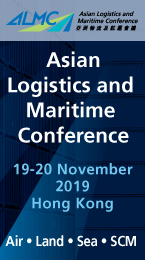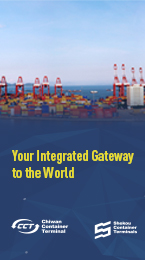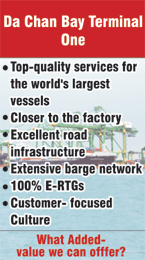|
Today's e-news sponsored by :
|
|
Powered by HKSG GROUP
|
|

|
|

|
|
The Leading Maritime & Transport News Portal
|
Wednesday, September 25, 2019
|

(Click on the above banner to know more)
|
|
|
|

|
|

|
|
|
|
Freight rate enquiries from shippers
|
|
Type
|
Loading Port
|
Discharge Port
|
Cargo Type
|
Volume
|
Action
|
|
Sea
|
Mumbai
|
Huangpu
|
General Cargo
|
FCL 1 x 20'
|
[
Reply
]
|
|
|

|
|

|
|
|
|
|
Hong Kong exports forecast to suffer largest decline in a decade
THE Hong Kong Trade Development Council (HKTDC) has forecast that the city's exports this year would suffer their largest decline in a decade due to the impact of the ongoing trade war between China and the United States.
The trade promotion body predicted that the city's exports would shrink 4 per cent by value, the worst performance since 2009 when they plunged 12.6 per cent during the depth of the global financial crisis. The forecast marked a significant downgrading of a previous prediction that exports would grow 2 per cent in 2019, reports the South China Morning Post.
The outlook came on the same day China's Customs Administration published a detailed breakdown of trade figures showing that shipments from the mainland to Hong Kong fell 7.7 per cent in the first eight months of this year, compared to the same period in 2018 - a faster rate of decline than the 6.3 per cent drop in the first half of the year.
China's overall overseas shipments rose 0.2 per cent between January and August, indicating a weakening of Hong Kong's role as a primary conduit for Chinese transshipments to end consumer markets in the US and European Union.
The research director for HKTDC, Nicholas Kwan said the China-US trade war was the biggest reason for Hong Kong's gloomier export outlook. "The trade war has not only affected our exports to the US but other markets such as Japan, Taiwan and even Vietnam," he said.
The city is also facing uncertainty as the US Congress tries to tie its preferential trade treatment to its human rights record amid continuing anti-government protests, Mr Kwan noted.
US lawmakers are attempting to push through the Hong Kong Human Rights and Democracy Act, a bipartisan bill that would require an annual review of the special treatment Washington affords the city - including special trade and business privileges - under the US-Hong Kong Policy Act of 1992.
"This is a political issue, but we hope the US understands that we are still one of the world's few free ports," Mr Kwan said, playing down the US threats.
"Even if we lose the special trade status, I don't think Hong Kong will be disappointed and in distress because over 90 per cent of goods we sell to the US are made elsewhere. And the US exports more goods to Hong Kong than we sell to them, which means cancelling the special trade deal is not in American interests at all," he said.
The Trade Development Council's quarterly export index, based on a survey of 500 traders in Hong Kong, tumbled to its lowest level since the first quarter of 2009 amid the gloomy prospects for the city's exports in coming months. The index fell to 27.4 in the third quarter from 37.3 in the preceding quarter.
A majority of traders surveyed said that the biggest immediate impact of the trade war had been a drop in the size of export orders, followed by stiffer bargaining over export prices. To mitigate the risks arising from the trade war, 45.3 per cent said they would work to develop export markets outside the US.

|
|
Smaller owners, feeder operators keep hold of majority share of intra-Asia market
THE mainline operator share of the intra-Europe, shortsea and feeder capacity has increased substantially over the last six years, Maritime Strategies International (MSI) director David Jordan told the Global Liner Shipping Asia conference in Singapore, organised by KNect365 Maritime.
The mainline operators have seen their share of the intra-Europea market rise from 59 per cent to 66 per cent.
"In contrast shortsea and feeder operators have lost market share dipping from around 41 per cent in January 2013 to just around a third in August this year," Mr Jordan was quoted as saying in a report by Seatrade Maritime News, Colchester, UK.
He said this had been caused by a combination of some shortsea players losing market share and others closing down altogether.
However, it's a different story in the fast growing intra-Asia market where the intra-regional and feeder operators have maintained a majority of the market, although the mainlines have expanded their market share.
Mr Jordan said that capacity in the intra-Asia market has risen by 40 per cent over the last six years to two million TEU.
"Mainline operator share has increased from 32 per cent to 38 per cent, which is a relatively modest increase and is largely due to the shortsea and feeder operators on the intra-Asia market really maintaining their share of capacity," he explained.

|
|
Low sulphur fuel availability remains a concern for container shipping lines
THERE is concern in the container shipping industry about whether there will be sufficient low sulphur fuel available for shipping lines to meet the International Maritime Organization's requirement that from January 1, 2020 ships use fuel with a sulphur content capped at 0.5 per cent, or install engine exhaust scrubbers.
Speaking during a panel discussion about the IMO 2020 regulation at the Intermodal Association of North America's Intermodal Expo in Long Beach, Hyundai Merchant Marine (HMM) senior vice president Lawrence Burns said it is not clear whether compliant fuel will be available at all ports, reported American Shipper.
One possibility is that carriers will have to resort to purchasing even more expensive 0.1 per cent sulphur fuel that carriers currently use in sulphur emission control areas (ECAs), he said. There is an ECA that extends for 200 miles from much of the coast of the US and Canada. ECAs also exist in the Caribbean, North Sea and Baltic Sea, and countries bordering the Mediterranean Sea are currently considering creating an ECA.
Mr Burns said that it is also difficult to ascertain how expensive the 0.5 per cent low-sulphur bunker fuel will be given that it is still not available on the market.
He said that carriers are also concerned about whether they will be able to recover the cost of more expensive fuel or the scrubbers that some, like Hyundai Merchant Marine, are installing at a cost of US$5 to $8 million per vessel.
Mr Burns warned that if carriers are not able to recover their costs, it could lead to a service reduction.
In the same panel discussion, Walmart Global Logistics director Laura Crowe said the retailer tried to be fair in the contracts it negotiated with carriers earlier this year in recognising the higher cost of fuel, but wanted to assure itself the charges carriers will impose are actually designed to reimburse them for their higher costs and not a way to make extra profit.
In addition to trying to understand how much more expensive the low sulphur fuel would be, Walmart worked with lines to understand the switch-over process - when they would have to start cleaning tanks and getting ready for the switch to low sulphur fuel.
"We feel very comfortable with where we landed with our contracts," said Ms Crowe.
SeaIntelligence Consulting chief executive officer Lars Jensen noted that the drone attack on the Aramco refinery in Saudi Arabia on September 14 is said to have knocked out five per cent global of refining capacity. He said the attack could have an even bigger implication for IMO 2020 because damage to desulfurisation units could reduce the ability to make clean fuels by an even larger percentage.
If a disaster such as the damage to the desulfurisation units at the Aramco refinery made it impossible for ships to obtain fuel to meet the IMO 2020 regulation, Mr Burns said: "I have to believe that our governments would kick in and relax regulations for a certain period of time."
JB Hunt Transport Services senior vice president Sarthak Verma said it is unclear what impact the increased bunker fuel costs as a result of IMO 2020 will have. The longer distance to ship cargo from many Asian destinations to the US east coast could result in some shippers deciding to route more Asian cargo to west coast ports.
On the other hand, the price of diesel fuel needed to move cargo by rail and truck from the US west coast to the east coast or inland destinations could also rise due to the need for more low sulphur bunker fuel.
However, a slowdown in the world economy and more efficient use of fuel could lower demand for fuel, said Mr Verma, which is another factor that could blunt the impact of IMO 2020.
Various shipping trade organisations are urging strict enforcement of the IMO 2020 regulation. On September 18, the World Shipping Council, BIMCO, Cruise Lines International Association, and the International Parcel Tankers Association, urged member states of the IMO to "fully implement" the new 0.5 per cent sulphur cap.
"Recent reports suggesting that some nations might not fully implement the new rules are disturbing. Lack of full implementation would risk undermining improvements to public health and the environment," said WSC president John Butler.
While the switch over to low sulphur bunker fuel may be disruptive in the short term, at the end of the day Mr Jensen questioned whether the increased cost of complying with the IMO 2020 regulation will have a major impact on the container industry.
He said bunker fuel currently costs $450 per tonne and that current indications are that low sulphur fuel will sell for $650-$700 per tonne. From 2011-2014, he said standard bunker fuel sold for $700-$750 per tonne.
During that time "this industry operated perfectly well," he said.

|
|
Insurers probe scrubber-related problems amid heightened risks for vessels
MARINE insurers are investigating at least two separate scrubber-related incidents as insurers seek clarity over the potential heightened risk involved in vessels fitted with the exhaust gas cleaning systems.
Scrubbers came under the spotlight recently at the annual industry conference of The International Union of Marine Insurers (IUMI) held in Toronto. According to Rama Chandran, chairman of IUMI's ocean hull committee, a recent spate of incidents involving scrubbers are now officially under review, reported UK's Lloyd's List.
One of the cases discussed during the conference involved a "catastrophic" engine room fire during a scrubber installation, AqualisBraemar managing director Paul Hill told IUMI.
"Any increased machinery on a vessel is going to be an increased risk," he said, speaking at the ocean hull committee question and answer session.
He provided no further details about the fire, nor an engine room flooding in a vessel cited as a first, separate incident. Both of which have not been independently confirmed as being caused by scrubbers, by either the vessel owner or manufacturers involved.
The conference heard that the rise in the use of exhaust gas cleaning systems will increase risk for the hull and machinery sector, alongside the introduction of untested blends of unstable, incompatible lower-sulphur fuel oil which could damage ship engines.
Lloyd's List approached the Clean Shipping Alliance 2020, a lobby group set up last year by major shipping companies that have invested in scrubber technology ahead of the International Maritime Organizations' 0.5 per cent sulphur cap, for comment on the issue. "We don't see it (EGCS) as any more of a liability than any other equipment in the engine room," CSA 2020 chairman Mike Kaczmarek said in a statement.
Some 3,000 scrubbers are estimated to be installed on the world's largest bulk carriers and tankers by the end of the year, allowing them to use high-sulphur fuel oil and remain compliant with the IMO 2020 sulphur cap on bunker fuels that comes into effect in January.
"We haven't got a lot more details of whether there's been any significant losses on scrubbers?so we don't know how extensive this is and how systemic, or whether this is specific to one type of scrubber," Mr Chandran said.
There is intensifying scrutiny of scrubbers amid reports of unexplained corrosion problems to pipework and discharge outlets that need replacement less than six months after installation.
Scrubbers remain untested technology, said Canadian shipowner Fednav's senior vice-president Thomas Paterson.
"What we hear from the ship managers is not encouraging. We hear of numbers of ships that are struggling to get the systems working, and a number of ships are having to put more crew on board to operate them. So certainly, it's a big issue."

|
|
Busan Port and Adani Ports SEZ ink MOU to set up logistics businesses in India
SOUTH Korea's Busan Port Authority (BPA) has announced that it concluded a memorandum of understanding (MoU) with Adani Ports and Special Economic Zone Limited, India's private port operator, for port logistics businesses in India.
The two parties agreed to jointly develop warehouses and other logistics facilities in the ports and inland container depots managed by Adani Group.
BPA president Kichan Nam commented: "India with high economic growth rates and rising harbour volume has very great demands for logistics infrastructure development. Busan Port Authority will closely cooperate with India's largest port operator Adani Ports and SEZ, actively pursuing various logistics business opportunities."
Adani Ports and SEZ Ltd, a part of the Adani Group, is India's largest private multi-port operator. Among many container terminals it operates, Mundra Port is one of the most important ports to the Group as it is the gateway to the northwest region of India.
According to Alphaliner, Mundra Port has rapidly grown to become the world's 36th largest port in 2018, handling 4.5 million TEU, an 11 per cent increase from the previous year, reports Steel Guru, of Haryana, India.

|
|
PSA's CTPL at Chennai port raises bar for terminal productivity in south, east India
PSA International's Chennai International Terminals Pvt Ltd (CITPL) has set a new vessel productivity record of 171 moves per hour for south and east India.
The terminal, one of the two container terminals operating at Chennai port, handled 3,023 moves in less than 19 hours on September 12, for the 4,252 TEU box ship, Wan Hai 507, reported The Hindu BusinessLine.
"Achieving a vessel rate of 171 moves per hour translates directly into cost savings for shipping lines and port users," CITPL general manager T Madhan Mohan said in a statement.
"We are also working closely alongside Chennai Port Trust to enhance the competitiveness of the port.
"Recent reductions in vessel related charges, increases in free time for direct port deliveries (DPD) and direct port exports (DPE), streamlining of road access, cuts in short haul rail charges by Indian Railways and the development of an empty container depot inside the port area are just some of the initiatives being taken by stakeholders towards this objective," he added.

|
|
Hyundai fined US$47m for selling high polluting diesel engines to US
HYUNDAI Construction Equipment Americas and Hyundai Industries Co Ltd have agreed in court to pay a US$47 million civil penalty for importing diesel engines that were not certified to meet Clean Air Act emissions standards.
According to the US Justice Department and Environmental Protection Agency (EPA), Hyundai "stockpiled" diesel engines between 2012 and 2015 that no longer met US emissions standards. These engines were installed in 2,269 pieces of construction equipment, which were then imported into the US, reported American Shipper.
Furthermore, Hyundai Construction Equipment Americas imported and sold this equipment in quantities that surpassed its exemption allowance under the Transition Programme for Equipment Manufacturers (TPEM) regulations. TPEM is a temporary exemption authorised by the EPA that permits diesel equipment manufacturers to postpone installing Tier 4-compliant engines in their products for up to seven years.
EPA said the company's illegal off-road diesel vehicle imports were not certified to meet pollutant emissions standards, particularly for nitrogen oxides (NOx) and particulate matter.
"By ignoring regulatory requirements, Hyundai not only gained a market advantage over their competitors, but they also introduced higher polluting vehicles into the United States, undermining the protection of human health and the environment," said Susan Bodine, EPA's assistant administrator for the Office of Enforcement and Compliance Assurance, in a statement.
EPA started its investigation into Hyundai Construction Equipment Americas' diesel engine imports in 2015. The court recently imposed a $1.95 million criminal fine against the company for the Clean Air Act violations.

|
|
FedEx slashes freighter capacity on weak outlook by retiring aircraft
FEDEX chairman Fred Smith has announced that the express giant is to cut its freighter capacity in response to weaker macroeconomic conditions.
First-quarter reported revenues were down slightly to US$17 billion, operating income slipped 8.8 per cent year on year to $977 million and net income fell 10.8 per cent to $745 million.
Mr Smith said the airline would retire 20 MD-10-10 aircraft over the current and next fiscal year to eliminate that fleet type from its operation. It was also "highly likely" that it would axe its remaining 10 A310 aircraft this year to exit that fleet type.
"In addition, we are parking the equivalent capacity of seven MD-11 aircraft this fiscal year," Mr Smith said.
FedEx Express chief executive and president Raj Subramaniam explained: "We expect the current softness in air cargo demand to continue into calendar year 2020. As such, we will take action to reduce our intercontinental flights after our peak season to better match supply to demand.
"We have already decreased US domestic flight hours and we will be aggressively looking for additional opportunities."
The delivery firm is also busy renewing its fleet, adding Boeing 777F and B767F aircraft, which have lower operational costs than the aircraft they will replace, reports London's Air Cargo News.
Mr Smith added that every time the company adds a B767, and to a lesser degree a B777, it is accretive to earnings because reliability goes up and costs are lowered.
Other costs cutting measures include deferring non-critical hiring, limiting discretionary spending and implementing structural cost initiatives.
The company is also increasing its use of automation and processing capabilities at two of its main hubs in Memphis and Indianapolis. This will improve productivity and also help mitigate recruitment issues.
The company has also lowered its expectations for the year and saw its first-quarter profits slip. Mr Smith said that global macroeconomic conditions were taking their toll on performance.
He explained that the China-US tariff war was not only affecting the US, but Europe was also coming under pressure because a slowdown in China was having an impact on German exports to the Asian powerhouse.
FedEx has also been caught up in the spat between the US and telecom firm Huawei and has been backing out of its deals with e-commerce giant Amazon.
On Amazon, Mr Smith listed the e-commerce company alongside UPS and DHL as one of its competitors.
He said FedEx has added additional business to make up for the loss of Amazon and this extra traffic would begin to flow through its financials over the coming months.
The company also continues to face costs associated with the integration of TNT.

|
|
CEVA Logistics renews contract with helicopter manufacturer Helibras in Brazil
CEVA Logistics has won a new five-year contract from Helibras, a Latin America-based helicopter manufacturer and subsidiary of Airbus.
The new deal builds on the strong working relationship the companies have developed since 2013, and covers two facilities in the north of the Sao Paulo region at Atibaia and Itajuba (Minas Gerais). The plants manufacture both civilian and military helicopters which are destined for a diverse end market including the oil and gas industry.
CEVA will continue to manage transport and warehousing at Atibaia, and warehousing at Itajuba where its staff manage ground transportation, inbound and outbound air freight logistics as well as a range of contract logistics functions within each warehouse. The Atibaia site holds SHOWCASE status, the highest level of site classification assessment, which can be achieved within the CEVA global network.
CEVA Logistics executive vice president Nadia Ribeiro said in a company statement: "Our commitment to safety, quality and productivity across the Helibras supply chain have been essential factors in the renewal of the business. Once again it shows CEVA's expertise in the aerospace logistics arena."

|
|
Telair develops loading system for A320 aircraft that can be adapted to fit cargo
TELAIR International has developed a modular cargo loading system (CLS) that enables the lower deck of a narrow-body aircraft to be converted for different cargo requirements. Certification is scheduled for the first quarter of 2020.
The CLS comprises pre-assembled floor modules that can be reconfigured "within a few hours" to accommodate full bulk or containerised cargo loading - depending on the type of freight that is to be loaded and transported, reported London's Air Cargo News.
The modular CLS has been developed as a post-delivery modification or retrofit conversion for Airbus A320 aircraft.
Launch customer Lufthansa Group has ordered 100 systems, to be installed on new A320/A321neo aircraft over the next six years, starting from the second quarter of 2020.
"This intelligent solution will help our customers optimise the performance of their fleets and reduce operational costs throughout the life cycle," Telair International chief executive Marko Enderlein was quoted as saying.
"As the aerospace market continues to grow strongly, and airlines are being increasingly challenged to be flexible to varied loads, the time had come to develop the modular cargo loading system."
The company believes leasing firms will benefit from an increase in the aircraft's residual value, as they will be able to offer long-term flexibility of lower deck cargo hold usage.

|
|
|
|
|

|
Copyright 2016 HKSG Group Media Ltd. All rights reserved.
|











